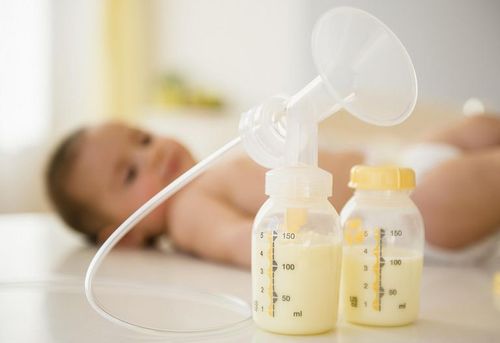This is an automatically translated article.
Actually the foods we eat provide energy for our daily activities. Therefore, the postpartum diet is a matter of concern for mothers taking care of newborns and breastfeeding.
1. Guidelines for a reasonable postpartum diet
For many new moms, the desire to lose weight can take precedence over feeding the body with the right diet to support recovery, milk production, rest and completion of all tasks other during the day. Dramatically reducing overall carbohydrate intake is a common weight loss strategy for many women who are not part of a proper postpartum diet. Carbohydrates are essential for new mothers, not only to produce breast milk, but also to protect mental health and regulate hormone balance. The good news is that a sensible postpartum diet can still help a woman lose a few pounds while still eating enough calories to meet the physical and emotional demands of caring for a young child. It's important to be patient, eat well, and take time for yourself. Here are some guidelines related to a healthy postpartum diet for women, including:
1.1 Choose a wide variety of foods from all the food groups During the postpartum period, or diet The first 3 months focus on adding healthy food sources of:
Protein Fruits Vegetables High-fiber carbs Fats like avocados, nuts and seeds Remember that the calorie count and macronutrient range Cases vary depending on a woman's activity level, body size, and several other factors. Additionally, if you have certain medical conditions such as diabetes, you may need to follow a different diet to optimize blood sugar control. Therefore, each woman's nutritional needs are different and they depend on many factors.
1.2 Stay hydrated throughout the day, says Dara Godfrey, MS, RD, registered dietitian nutritionist and member of the New York Society for Reproductive Medicine, saying that hydration is especially important if you're breastfeeding. Breastfeeding is very important. She recommends postpartum women drink up to 3 liters of water a day.

Phụ nữ nên bổ sung đủ nước cho cơ thể trong suốt một ngày dài
However, hydration needs can vary, so it's best to let thirst be your guide. A good way to measure water is to see the color of urine. Light yellow urine indicates the proper amount of water while dark urine indicates that the body is dehydrated and needs to replenish more water.
1.3 Track Your Calories Fueling your body with the right amount of calories will help maintain energy and milk supply. According to the Centers for Disease Control and Prevention (CDC), a nursing mother should consume about 2,300 to 2,500 calories per day compared with 1,800 to 2,000 calories for a non-breastfeeding woman. However, individual calorie needs vary widely and depend on the child's body size, age, activity level, and breastfeeding needs.
1.4 Ideal weight loss should be slow and gradual If you're trying to lose weight while breastfeeding, the Academy of Nutrition and Dietetics says weight loss is about 1 pound per week or 4 pounds every month is ideal.
1.5 Continue to take prenatal vitamins A suitable postpartum diet is that mothers should continue to take prenatal vitamins, or vitamins specifically for postpartum mothers. If you're not breast-feeding but want additional nutrients, talk to your doctor for advice on what to eat for the first six months after giving birth.
1.6 Limit caffeine intake Although small amounts of caffeine passed from a woman to her baby through breast milk are not known to adversely affect your infant, the CDC still recommends 300mg or less of caffeine per day. .
1.7 Minimize Empty Calories Try to minimize snacks and foods high in sugar, sodium and saturated fat, including fried foods, soft drinks and desserts.

Phụ sau sinh nên hạn chế sử dụng nước ngọt
1.8 Avoid fish high in mercury If you are breastfeeding, avoid seafood and fish with high levels of mercury such as orange shark, tuna, mackerel, sardines, shark, swordfish or tile fish. Instead, choose salmon, shrimp, cod, tilapia, halibut, and a few others.
1.9 Limit Alcohol While Breastfeeding Although many women decide not to drink while breastfeeding, if you choose to drink, drink in moderation or try to limit it and don't breastfeed for 2 to 5 years. 3 hours after drinking.
2. Postpartum diet and milk supply
According to the Academy of Nutrition and Dietetics, women who are exclusively breastfeeding need about 400 to 500 additional calories per day, which is more than the recommended amount for people who are not breastfeeding.
If you are breastfeeding, don't worry if the weight doesn't drop immediately. For some women, breastfeeding helps them lose weight faster than other mothers who don't breastfeed.
Research Trusted Source has shown that, although weight loss is slower during the first 3 months of breastfeeding because new mothers need to increase their calorie intake to meet milk production needs, weight loss seems to increase after the birthmark. 3 months when mothers are breastfeeding tend to increase the burning of fat stores.
Other women may notice an increase in fat storage in the hips or legs until breastfeeding is stopped. This may be because the production of breast milk increases the consumption of fat from the mother's body stores to support the infant's brain development.
To maintain your milk supply and nourish your body, it is important to focus on consuming food sources that contain all the basic groups of substances: healthy fats, proteins and carbohydrates.
Breast milk in general consists of 87% water, 3.8%b fat, 1.0% protein and 7% lactose. It can be seen that even if the daily nutrient intake does not meet the recommended amount, your milk still provides enough nutrition for your baby. However, that doesn't mean you should cut back on essential carbohydrates, proteins or fats. Doing so will only deplete you as your body uses everything it can to make milk for your baby.

Phụ nữ cho con bú nên có chế độ dinh dưỡng hợp lý
Although general nutritional recommendations suggest that complex carbohydrates should make up about 45 to 64 percent of daily calories. However, when breastfeeding, it is necessary to adjust your diet based on factors such as overall health and activity level. Women with high blood sugar may need to eat fewer carbs to optimize blood sugar control, while active women may have higher needs.
It is undeniable that establishing a full postpartum diet will help mothers have enough milk to feed their babies, at the same time ensure health, limit common problems after giving birth.
If you need more advice on postpartum nutrition and how to take care of young children, you can contact Vinmec International General Hospital for advice by experts and specialists.
Please dial HOTLINE for more information or register for an appointment HERE. Download MyVinmec app to make appointments faster and to manage your bookings easily.













